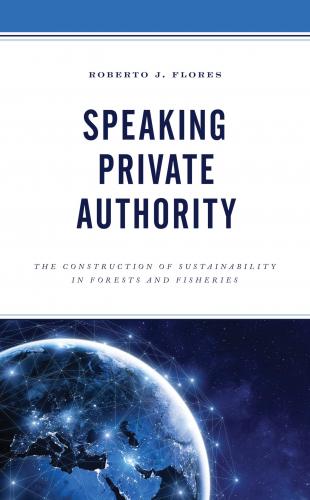Speaking Private Authority. Roberto J. Flores
the State.
22. Raustiala. “States, NGOs and International Environmental Institutions,” 719–740.
23. Keck and Sikkink. Activists Beyond Borders.
24. Cutler, Haufler, and Porter. Private Authority and International Affairs.
25. Young and Levy. The Effectiveness of International Environmental Regimes.
26. Hall and Biersteker. The Emergence of Private Authority in Global Governance.
27. Auld. Constructing Private Governance.
28. Cashore, Auld, and Newsom. Governing through Markets.
29. Auld. Constructing Private Governance.
30. Green. Rethinking Private Authority.
31. Craven, P. and Wellman, B. “The Network City.” Sociological Inquiry 43 (1973): 57–88.
32. Risse-Kappen. Bringing Transnational Relations Back In.
33. Strange. The Retreat of the State.
34. Raustiala. “States, NGOs and International Environmental Institutions,” 719–740.
35. Keck and Sikkink. Activists Beyond Borders.
36. Cutler, Haufler, and Porter. Private Authority and International Affairs.
37. Hall and Biersteker. The Emergence of Private Authority in Global Governance.
38. Pattberg, P. H. Private Institutions and Global Governance: The New Politics of Environmental Sustainability. Cheltenham, UK: Edward Elgar, 2007.
39. Castells, M. The Rise of the Network Society. Blackwell Publishers Inc., 2011.
40. In defining social structures in this work, I borrow from Crothers 2013 (p. 4) who defined it as “relations among people, between groups or institutions, and backwards and forwards between people and groups.” This definition is indicative of the mutually constitutive nature of social structure, as Crothers goes on to make the claim that “[h]uman action in turn, feeds back to affect the operation of social structures: there is an ongoing, reciprocal process of shaping and feedback between participants and social structures.”
41. Castells. The Rise of the Network Society, 1996: 470.
42. Ibid.
43. Ibid.
44. The traditional forms here are primarily dependent on static power transference (i.e., re-organization of bureaucracies, creation of new bureaucracies, greater budget allocations).
45. It is important to note that this book is not aimed at furthering Castell’s full theory of the network society. It only adopts the theory as it applies to private governance authority in the environmental sector. Castell’s theory is vast and wide-ranging, encompassing the whole of global society, as he sees history moving into the information age. His broader assumptions are far beyond the scope of this book. However, Castell’s explanation of the social processes that drive the movement toward network society can be seen operating within specific sectors that are being governed by private actors organized in networks. These networks thrive on the processing of complex and high-volume information that is transmitted rapidly across the networks via modern communications technologies. Thus, Castells’s theory of networks provides a critical frame by which to expand understanding.
46. Epstein, C. The Power of Words in International Relations: Birth of an Anti-whaling Siscourse. Cambridge, MA: MIT Press, 2008: 186.
47. Abdelal, R., Blyth, M., and Parsons, C. Constructing the International Economy. Ithaca, N.Y.: Cornell University Press, 2010: 175.
48. Castells, M. The Rise of the Network Society: End of Millennium. Vol. III, Malden: Blackwell Publishers, 2000: 3.
49. Haas, P.M. “Introduction: Epistemic Communities and International Policy Coordination.” International Organization 46, no. 01 (1992): 1–35.
50. Strange. The Retreat of the State.
51. Keck and Sikkink. Activists Beyond Borders.
52. Barnett, M. N. and Finnemore, M. Rules for the World: International Organizations in Global Politics. Ithaca, N.Y.: Cornell University Press, 2004.
53. Bernstein, S. and Cashore, B. “Non-state Global Governance: Is Forest Certification a Legitimate Alternative to a Global Forest Convention?” in Kirton, J. and Trebilcock, M. eds., Hard Choices, Soft Law: Combining Trade, Environment and Social Cohesion in Global Governance. Aldershot, UK: Ashgate, 2004: 33–63.
54. Lake, D. Hierarchy in International Relations. Ithaca, NY: Cornell University Press, 2009.
55. Green. Rethinking Private Authority.
56. Strange. The Retreat of the State, 65.
57. Contractual right here is an allusion to Rousseau’s social contract theory—expressed in his 1762 work The Social Contract—where he states, “Let us then admit that force does not create right, and that we are obliged to obey only legitimate powers” (Penguin Edition 1968, p. 168).
58. Green. Rethinking Private Authority, 35.
59. Risse-Kappen. Bringing Transnational Relations Back In.
60. Strange. The Retreat of the State, 1996.
61. Raustiala. “States, NGOs and International Environmental Institutions,” 719–740.
62. Raustiala. “States, NGOs and International Environmental Institutions,” 719–740.
63. Cutler, Haufler, and Porter. Private Authority and International Affairs.
64. Young and Levy. The Effectiveness of International Environmental Regimes.
65. Pattberg. “The Institutionalization of Private Governance.”
66. Auld. Constructing Private Governance.
67. Hall and Biersteker. The Emergence of Private Authority in Global Governance, 5.
68. Green. Rethinking Private Authority, 6.
69. Friedman, R.B. “On the Concept of Authority in Political Philosophy.” In Joseph Raz, ed., Authority . New York: New York University Press, 1990: 69–71.
70. Howarth, D. R., Norval, A. J., and Stavrakakis, Y. Discourse Theory and Political Analysis: Identities, Hegemonies, and Social Change. Manchester: Manchester University Press, 2000: 131.
71. Wendt, A. Social Theory of International Politics. Cambridge, U.K.: Cambridge University Press, 1999: 164.
72. Howarth, Norval, and Stavrakakis. Discourse Theory and Political Analysis, 7.
73. Laclau, E. and Mouffe, C. Hegemony and Socialist Strategy: Towards a Radical Democratic Politics. London: Verso, 1985 (as found in Howarth, Norval, and Stavrakakis. Discourse Theory and Political Analysis, 7).
74. Epstein, C. The power of words in international relations: Birth of an anti-whaling discourse. Cambridge, Mass: MIT Press, 2008.
75. Ibid.
76. Howarth, Norval, and Stavrakakis. Discourse Theory and Political Analysis.
77. Epstein. The Power of Words in International Relations (as found in Abdelal, 2010: 175–193).
78. George, A. L. and Bennett, A. Case Studies and Theory Development in the Social Sciences. Cambridge, MA: MIT Press, 2005.
79. Bennett, A. and Checkel, J. T. Process Tracing: From Metaphor to Analytic Tool. Cambridge: Cambridge University Press, 2015.
80. Laclau and Mouffe. Hegemony and Socialist Strategy.
81. Sending, O. J. The Politics of Expertise: Competing for Authority in Global Governance. Ann Arbor: University of Michigan Press, 2015: 22.
82. Sending. The Politics of Expertise, 23.
83. Green. Rethinking Private Authority.
84. For additional information
